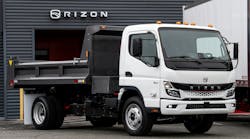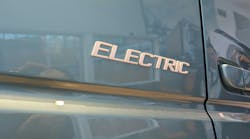Normally when you hear the term scope creep you think of it as a negative. A project that has grown and grown outside its initial parameters. When that happens more resources, more time and more money are needed to complete the project
I’ve been thinking about scope as it applies to the work we do here at NACFE with Trucking Efficiency. We rely on our core team of what we call NACFE Fleets — fleets that have worked with us to share their best practices as they relates to improving freight efficiency. We are grateful to them for the insights and advice they give us. We’ve also counted on folks like Michelin and its Fleet Forum and Kevin Rutherford’s “Normally when you hear the term scope creep you think of it as a negative. A project that has grown and grown outside its initial parameters. When that happens more resources, more time and more money are needed to complete the project.
truckers’ group to help us when we are working on Confidence Reports.
I’ve been thinking about scope as it applies to the work we do here at NACFE with Trucking Efficiency. We rely on our core team of what we call NACFE Fleets — fleets that have worked with us to share their best practices as they relates to improving freight efficiency. We are grateful to them for the insights and advice they give us. We’ve also counted on folks like Michelin and its Fleet Forum and Kevin Rutherford’s “lets talk" truckers’ group to help us when we are working on Confidence Reports.
But lately I’ve been wondering if we’re getting too comfortable relying on the same people to bounce our ideas off of and to solicit input from.
That’s why I’ve decided to expand our efforts to reach out to more fleets of all sizes. The more real-world input we get the better job we can be at understanding the impact fuel efficiency technologies have on fleets of all sizes. Implementing and funding change presents different challenges for smaller fleets than it does for larger one. Large fleets tend to have the resources to introduce new technology sooner and have the resources to test technology in a portion of their fleet without committing to a technology on their entire fleet until it’s proven to work in their application. That’s easier to do when you have 2,000 trucks than if you have 20. Yet it’s just as important that smaller fleets be as fuel efficient as possible since small fleets make up the bulk of trucking companies operating in North America.
In order for us to expand the scope of information we include in our research efforts, during 2015 my team and I are going to actively reach out to a wider range of industry stakeholders to make sure we are including as many voices as possible in our efforts.
We’re starting this outreach at this year’s Technology & Maintenance Council meeting, stop by and see us in booth 1209. While we don’t have a formal outreach program in place, Trucking Efficiency team members are hoping to have lots of good conversations with fleets about their efforts to improve their fuel efficiency and the challenges they face trying to implement those fuel efficiency solutions.
We’ll also be at the Mid-America Truck Show, NPTC, ACT Expo and other events throughout the year. So keep an eye out for us because we’ll be looking for you.
And of course, I always have time to chat with fleets or suppliers of fuel efficiency technologies to learn about what they are doing.
While for lots of folks scope creep is a bad thing, here at Trucking Efficiency we think it’s going to make us even better.
But lately I’ve been wondering if we’re getting too comfortable relying on the same people to bounce our ideas off of and to solicit input from.
That’s why I’ve decided to expand our efforts to reach out to more fleets of all sizes. The more real-world input we get the better job we can be at understanding the impact fuel efficiency technologies have on fleets of all sizes. Implementing and funding change presents different challenges for smaller fleets than it does for larger one. Large fleets tend to have the resources to introduce new technology sooner and have the resources to test technology in a portion of their fleet without committing to a technology on their entire fleet until it’s proven to work in their application. That’s easier to do when you have 2,000 trucks than if you have 20. Yet it’s just as important that smaller fleets be as fuel efficient as possible since small fleets make up the bulk of trucking companies operating in North America.
In order for us to expand the scope of information we include in our research efforts, during 2015 my team and I are going to actively reach out to a wider range of industry stakeholders to make sure we are including as many voices as possible in our efforts.
We’re starting this outreach at this year’s Technology & Maintenance Council meeting, stop by and see us in booth 1209. While we don’t have a formal outreach program in place, Trucking Efficiency team members are hoping to have lots of good conversations with fleets about their efforts to improve their fuel efficiency and the challenges they face trying to implement those fuel efficiency solutions.
We’ll also be at the Mid-America Truck Show, NPTC, ACT Expo and other events throughout the year. So keep an eye out for us because we’ll be looking for you.
And of course, I always have time to chat with fleets or suppliers of fuel efficiency technologies to learn about what they are doing.
While for lots of folks scope creep is a bad thing, here at Trucking Efficiency we think it’s going to make us even better.


